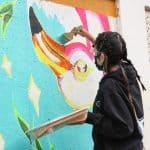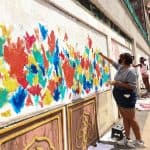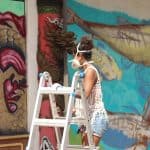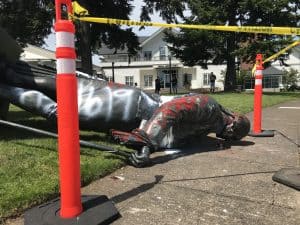Arts consultant George Thorn on strategizing for a post-COVID world
By Joni Renee Whitworth
George Thorn is a co-founder of Arts Action Research, a national arts-consulting group. The focus of his consulting is the Regional Arts & Cultural Council’s Cultural Leadership Program. He also co-leads RACC’s Art of Leadership, a six-part board training program offered annually. More about George, below.
George shared his thoughts about navigating the uncertainty of this pandemic and creating a strategy for engaging with artists and audiences.
Arts and culture will never be needed more than they are today. Considering artists and arts organizations, we know that everyone’s going to be hurt in some way, except for the very wealthy. There are a lot of people and a lot of sectors’ going to hurt really, really badly. That’s the world that we are inhabiting. Our message to audiences is: “Please stay with us. We’re in this together.”
What’s the next step for arts orgs in putting together a strategic plan for after the pandemic? Some people are in relatively good shape, some of them really have cash flow problems, whatever it is. We know that we’re not going to go back to the way it was. It’s going to be a very different reality. It’s time to ask the leadership of each organization to begin to envision what they think this new reality will be for them, how they begin to think about it, what needs to be in it, who needs to be in it, what are the needs within that, what do we need to learn? Knowing as they develop this vision of the next reality, they’ll have to be very adaptive and keep learning.
How are we going to evolve? We need a very simple sort of plan of evolution and financial framework and a programmatic framework. With that plan, which will keep changing, leaders can say to everyone who’s close to them, “This is what we know now. These are things we’re envisioning. We have a timeline that we want to begin. We have intended to do this project here and there. At a certain point, we have made a decision whether or not we can do that project.” Then it’s a matter of helping keep that information going. So, as an arts leader, you’re really saying, “Knowing what we don’t know, so and so, what we’re doing, please stay with us, we’re in this together. We can’t wait to get back into a room with you, with artists making art.”
There is a point of no return. If we want to do a show in October, what’s the point of no return when we have to do that, when we have to make that decision? What artists are doing now, in terms of streaming and video, that’s all testing. Is this a good experience for the artists? Is this a good experience for the audience? It’s different from someone teaching yoga. I think it’s pretty straight ahead. We could consider hosting one-person shows, but we also know that people at some point will want to get into a room again with artists making their work, or get into a gallery to see art in person.
I had some contact with some arts leaders, and they said, “We don’t know anything, so we can’t plan.” Well, now’s the time to plan, because if we wait till we know everything, we’ll be too far behind. A good example of someone who’s doing good work is Samantha from Shaking the Tree Theatre. When the pandemic began, I said, “Samantha, so what are you doing?”
She said, “I spent half the day in the office. The other half of the day, I’m in the theater. I’m painting eight, six by eight panels. I’m working with a sound engineer and a lighting engineer. I’m going to create an immersive experience called Refuge.” That production may have a life in the fall. But this is the artist’s way of thinking: “I want to be back in the studio. I want to be making work.”
Art’s now going to be redefined in different ways by different people. What is that connection with audiences, with readers, with gallery goers?
Artists give us perspective. They give us a way of thinking. It’s in their responses to what they’re seeing and hearing and thinking about. We saw that so much after 9/11: people went out eventually, but they wanted a wide range of things. Some people wanted Beethoven. Some people wanted to laugh, so they went to a comedy club. Some people needed to write. We will come back together, but people will want to experience art in a very personal way, and in all forms: theater, dance, music, literary, AR/XR, visuals. We may get some new audiences through that. Some people may not think of going into a performance venue, but they somehow got into streaming one artist or another online during COVID-19. Oregon Shakespeare Festival is streaming video of shows they’ve done, but it’s a different experience.
Many arts organizations want “the younger audience”. In Gen Z, everyone is a storyteller, a videographer. They’re making work. They’re showing their work. They’re influencers. They participate; their communication is totally participatory. Most traditional art is observational; you sit and observe – a totally different experience. Smart arts leaders need to think about how to market, then, to these people. Normally, when you go into a theater, the house lights go to half, then you turn off your phones and devices. We may be ready to change that model. We need to be thinking about meeting everyone’s needs and making art more participatory. We do have examples of, “After the show, please go on the web and leave a comment”, but that’s not a real talk back; that is still observing.
Now, if we have phones out at a concert, the older audience may resist it. They want to have a singular focus. We have tension there. It’s time to address it. This is an interesting space. Let’s see if there is some other way to address this, creatively. This is what artists do every day. Artists come up with an idea for a project, whatever it is, and they invest in that, whether it’s a single artist or a group project, it’s about problem solving. What they do is they solve problems, they have vision! There’s never enough time, people or money, but they still make it happen. How do we collaborate, who do we need to collaborate with? Where is our audience and our buyers? What artists do every day is solve problems, move forward, have a vision, and keep the project going. In that way, the pandemic is not as new – this is the type of thinking artists do every day.
For any artist starting any project, there’s a risk. You have no idea how it’s going to turn out, whether anyone’s going to be interested in it, what’s the audience that we want for this work, etc. But we do have a process. Scientists and artists share a process: trial, discovery, vision. With a scientific process, the idea is someone puts forth an assumption, and everybody does everything they can do to disprove it. If you can’t disprove it, it becomes a new reality. With making art, someone puts forth an assumption and through collaboration and work and so forth, something new and larger is created. The making of art, the creative process, is the best planning, problem solving and decision-making process available to human beings. I’m amazed every day by what artists make with so little.
George Thorn works as a consultant in all aspects of organizational development as well as making presentations to conferences and workshops. In parallel with his consulting activities, for eighteen years he directed the graduate program in Arts Administration at Virginia Tech in Blacksburg, Virginia. He was the Associate Director of FEDAPT. Prior to these activities, he was the Executive Vice-President of the Eugene O’Neill Theater Center. George spent sixteen years in New York where he had a general management firm that managed Broadway, Off-Broadway, and touring companies. George began his career as a stage manager of Broadway productions. In 1996, he relocated to Portland, Oregon, to open the West Coast office of Arts Action Research. In Portland, he has consulted with over three hundred and fifty arts and cultural organizations and artists.




